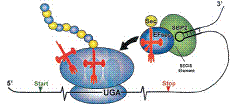Biochemistry, Department of

Vadim Gladyshev Publications
Document Type
Article
Date of this Version
7-18-2008
Abstract
Selenium is an essential dietary element with antioxidant roles in immune regulation, but there is little understanding of how this element acts at the molecular level in host defense and inflammatory disease. Selenium is incorporated into the amino acid selenocysteine (Sec), which in turn is inserted into selenoproteins in a manner dependent on Sec tRNA[Ser]Sec. To investigate the molecular mechanism that links selenium to T cell immunity, we generated mice with selenoprotein-less T cells by cell type-specific ablation of the Sec tRNA[Ser]Sec gene (trsp). Herein, we show that these mutant mice exhibit decreased pools of mature T cells and a defect in T cell-dependent antibody responses. We also demonstrate that selenoprotein deficiency leads to oxidant hyperproduction in T cells and thereby suppresses T cell proliferation in response to T cell receptor stimulation. These findings offer novel insights into immune function of selenium and physiological antioxidants.


Comments
Published in THE JOURNAL OF BIOLOGICAL CHEMISTRY VOL. 283, NO. 29, pp. 20181–20185, July 18, 2008. Copyright 2008. Used by permission.